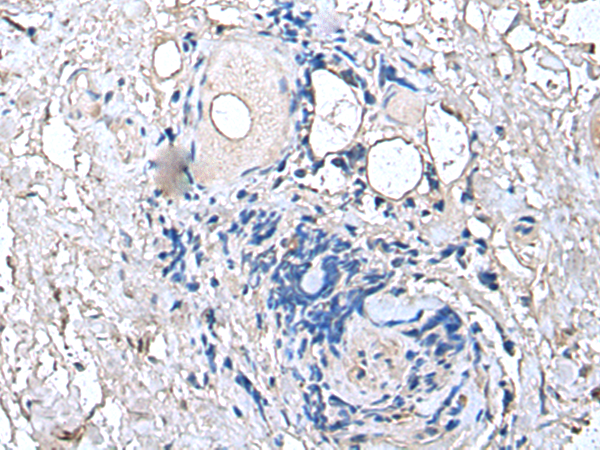
| WB | 咨询技术 | Human,Mouse,Rat |
| IF | 咨询技术 | Human,Mouse,Rat |
| IHC | 1/30-1/150 | Human,Mouse,Rat |
| ICC | 技术咨询 | Human,Mouse,Rat |
| FCM | 咨询技术 | Human,Mouse,Rat |
| Elisa | 1/5000-1/10000 | Human,Mouse,Rat |
| Aliases | HH72; PRL1; PRL-1; PTPCAAX1; PTP(CAAX1) |
| Host/Isotype | Rabbit IgG |
| Antibody Type | Primary antibody |
| Storage | Store at 4°C short term. Aliquot and store at -20°C long term. Avoid freeze/thaw cycles. |
| Species Reactivity | Human, Mouse, Rat |
| Immunogen | Fusion protein of human PTP4A1 |
| Formulation | Purified antibody in PBS with 0.05% sodium azide and 50% glycerol. |
+ +
以下是关于PTP4A1抗体的3篇参考文献的简要信息:
1. **文献名称**:*"PTP4A1 promotes tumor progression through dephosphorylation of oncogenic tyrosine phosphatase substrates"*
**作者**:Wang Y, et al.
**摘要**:研究揭示了PTP4A1通过去磷酸化特定酪氨酸底物(如EGFR、STAT3)促进肿瘤细胞增殖和迁移,开发的PTP4A1抗体在体外实验中验证了其调控信号通路的作用。
2. **文献名称**:*"Characterization of monoclonal antibodies against human PTP4A1 for functional studies in cancer"*
**作者**:Li H, et al.
**摘要**:报道了针对人源PTP4A1的单克隆抗体制备及验证,该抗体在免疫沉淀和免疫荧光中表现优异,并证实PTP4A1在结直肠癌中高表达且与预后相关。
3. **文献名称**:*"PTP4A1 regulates cell motility and invasion via extracellular matrix remodeling in pancreatic cancer"*
**作者**:Zhang L, et al.
**摘要**:利用PTP4A1抗体研究发现,其通过调控MMP2/9表达促进胰腺癌细胞侵袭,抗体阻断实验显著抑制了体内外肿瘤转移能力。
以上文献均聚焦于PTP4A1抗体的开发或应用,涉及肿瘤机制与治疗潜力。
**Background of PTP4A1 Antibody**
PTP4A1 (Protein Tyrosine Phosphatase 4A1), also known as PRL-1. is a member of the protein tyrosine phosphatase (PTP) family, which plays critical roles in regulating cellular signaling pathways. Unlike classical PTPs, PTP4A1 belongs to the phosphatases of regenerating liver (PRL) subfamily, characterized by a unique C-terminal prenylation motif (CAAX box) that influences its subcellular localization. PTP4A1 is implicated in diverse cellular processes, including cell proliferation, migration, and metastasis, often through interactions with oncogenic signaling pathways such as MAPK and PI3K/AKT. Overexpression of PTP4A1 has been observed in multiple cancers (e.g., colorectal, breast, and liver cancers), correlating with poor prognosis and aggressive tumor behavior.
Antibodies targeting PTP4A1 are essential tools for studying its expression, localization, and functional roles in both normal and pathological contexts. These antibodies enable detection via techniques like Western blotting, immunohistochemistry (IHC), and immunofluorescence (IF), aiding in the exploration of PTP4A1's involvement in cancer progression and its potential as a therapeutic target. Recent studies also investigate its role in non-cancerous conditions, such as metabolic disorders. Despite its established oncogenic properties, the precise molecular mechanisms of PTP4A1 remain under investigation, highlighting the continued need for reliable antibodies to advance research and diagnostic applications.
×